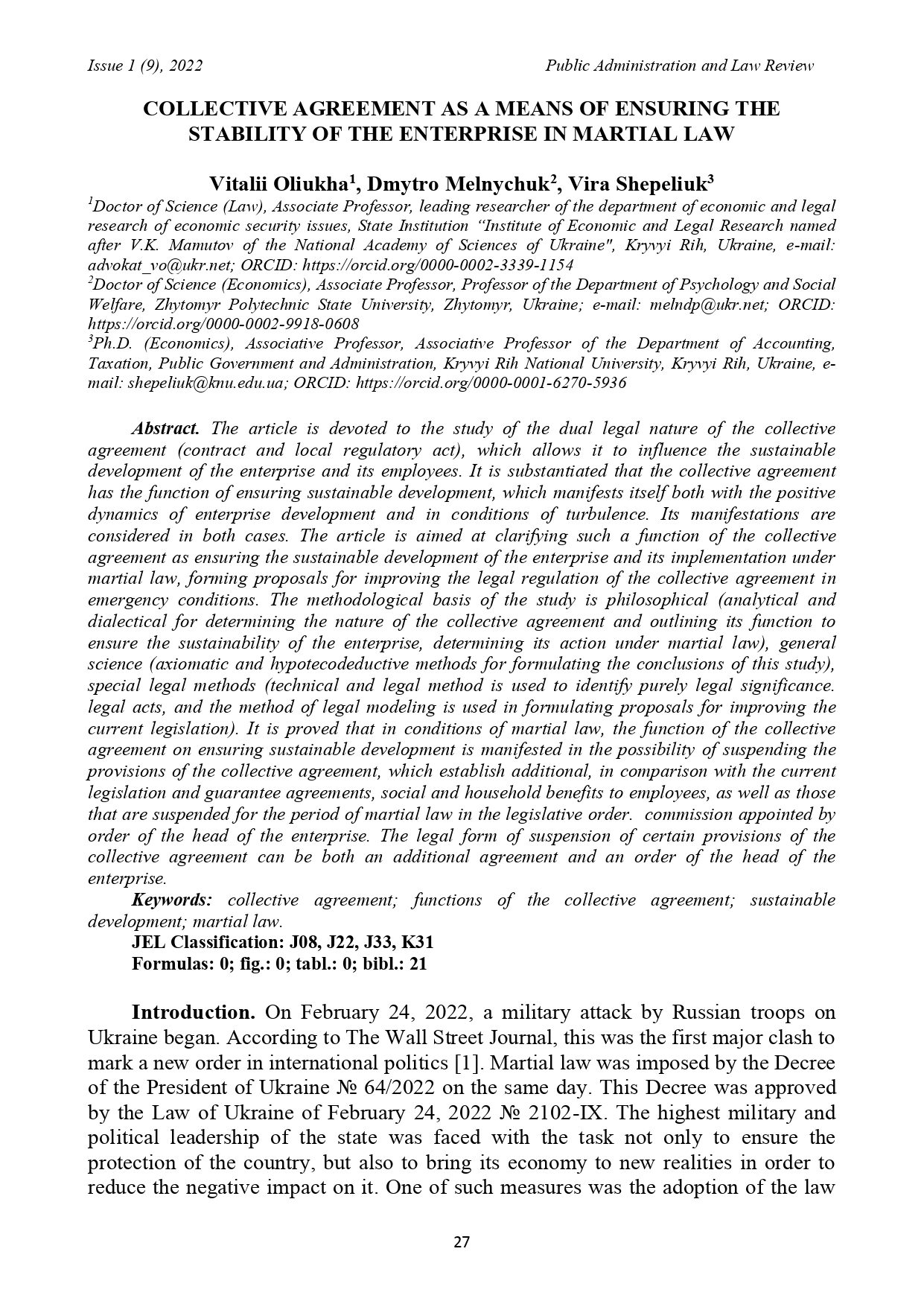Collective agreement as a means of ensuring the stability of the enterprise in martial law
DOI:
https://doi.org/10.36690/2674-5216-2022-1-27Keywords:
collective agreement, functions of the collective agreement, sustainable development, martial lawAbstract
The article is devoted to the study of the dual legal nature of the collective agreement (contract and local regulatory act), which allows it to influence the sustainable development of the enterprise and its employees. It is substantiated that the collective agreement has the function of ensuring sustainable development, which manifests itself both with the positive dynamics of enterprise development and in conditions of turbulence. Its manifestations are considered in both cases. The article is aimed at clarifying such a function of the collective agreement as ensuring the sustainable development of the enterprise and its implementation under martial law, forming proposals for improving the legal regulation of the collective agreement in emergency conditions. The methodological basis of the study is philosophical (analytical and dialectical for determining the nature of the collective agreement and outlining its function to ensure the sustainability of the enterprise, determining its action under martial law), general science (axiomatic and hypotecodeductive methods for formulating the conclusions of this study), special legal methods (technical and legal method is used to identify purely legal significance. legal acts, and the method of legal modeling is used in formulating proposals for improving the current legislation). It is proved that in conditions of martial law, the function of the collective agreement on ensuring sustainable development is manifested in the possibility of suspending the provisions of the collective agreement, which establish additional, in comparison with the current legislation and guarantee agreements, social and household benefits to employees, as well as those that are suspended for the period of martial law in the legislative order. commission appointed by order of the head of the enterprise. The legal form of suspension of certain provisions of the collective agreement can be both an additional agreement and an order of the head of the enterprise.
Downloads
References
Gordon M. R. (2022), “Ukraine crisis kicks off new superpower struggle among US, Russia and Chine”, The Wall Street Journal, retrieved from : https://twitter.com/WSJ/status/149688656258762.
Chervanov, D. M. and other (2011), Mizhdystsyplinarnyi slovnyk z menedzhmentu [Interdisciplinary dictionary of management], Nichlava, Kyiv, Ukraine, 623 p.
Hruzinova, L. P. and Korotkin, V. H. (2003), Trudove pravo Ukrainy [Labor law of Ukraine], MAUP, Kyiv, Ukraine, Part 1, 128 p.
Parkhomenko, N. M. (2009), “Sources of law: theoretical and methodological principles”, Abstract of Ph.D. dissertation, Legal sciences, Kyiv, Ukraine, 442 p.
Losytsia, I. O. (1997), “Collective agreement in the transition to a market economy”, Ph.D. Thesis, Legal sciences, Kharkiv, Ukraine.
Mnushko, Z. N. and Chmyihalo, N. M. (2002), Trudovoe pravo v usloviyah ryinochnoy ekonomiki [Labor law in a market economy], NFaU : Zolotyie stranitsyi, Kharkiv, 184 p.
Chanysheva, H. I. (2022), “Collective agreements and agreements as forms of social partnership”, retrieved from : http://www.naiau.kiev.ua/tslc/pages/biblio/visnik/n2001_1/chanisheva.htm.
Khrabatyn, O. V. (2021), “The effectiveness of the collective agreement as an indicator of the implementation of collective bargaining”, Pidpryiemnytstvo, hospodarstvo i pravo, №3, pp. 151-155.
Potopakhina, O. M. (2022), “Collective agreement as a source of labor law”, retrieved from : http://dspace.onua.edu.ua/bitstream/handle/11300/11099/Potopahina.
Trudovoe pravo v voprosah i otvetah [Labor law in questions and answers], Odissey, Kherson, Ukraine, 599 p.
Zabolotna, N. Ia. (2017), “Collective agreement: some problems of legal technique of creation and interpretation”, retrieved from : https://science.lpnu.ua/sites/default/files/journal- paper/2017/aug/5682/vnulpurn201685564.pdf.
Yurydychna entsyklopediia [Legal encyclopedia], Kyiv, Ukraine, Part 4, 720 p.
Tsvika, M. V. Tkachenka, V. D. and Petryshyna, O. V. (2002), Zahalna teoriia derzhavy i prava [General theory of state and law], Pravo, Kharkiv, 432 p.
Chervanov, D. M. (2011), Mizhdystsyplinarnyi slovnyk z menedzhmentu [Interdisciplinary dictionary of management], Nichlava, Kyiv, Ukraine, 623 p.
Melnychuk, O. F. (2022), “Functions of a collective agreement in market conditions”, retrieved from : http://repository.vsau.org/getfile.php/1768.pdf.
Kviatkovska, L. A. (2013), “Implementation of the principles of the concept of sustainable development in the enterprise”, Visnyk sotsialno-ekonomichnykh doslidzhen, vol. 1, pp. 85-89.
Vetsko, T. M. (2019), “Sustainable development of the enterprise: problems and prospects”, Aktualni problemy ekonomiky ta upravlinnia, vol. 13.
Demianenko, T. I. (2020), “Sustainable development of domestic enterprises in modern economic conditions”, Vcheni zapysky TNU imeni V.I. Vernads'koho, vol. 31 (70), no. 2.
Suhorukova, T. V. (2001), “Economic sustainability of the enterprise”, Jekonomika Ukrainy, vol. 5, pp. 48-52.
The Verkhovna Rada of Ukraine (1993), The Law of Ukraine “About collective agreements and contracts”, from 01.07.1993 № 3356-XII, retrieved from : https://zakon.rada.gov.ua/go/3356-12.
The Verkhovna Rada of Ukraine (2022), The Law of Ukraine “About the organization of labor relations in the conditions of martial law”, from 15.03.2022 № 2136-IX, retrieved from : https://zakon.rada.gov.ua/go/2136-20.

Downloads
Published
How to Cite
Issue
Section
License
Copyright (c) 2022 “Scientific Center of Innovative Researches” OÜ

This work is licensed under a Creative Commons Attribution-NonCommercial-NoDerivatives 4.0 International License.





